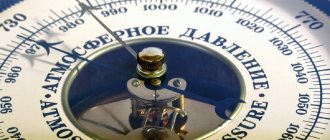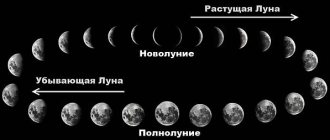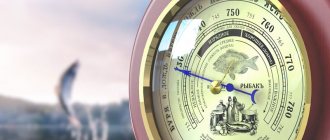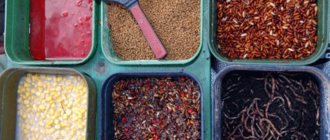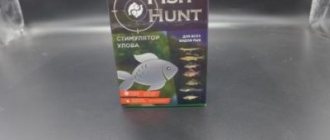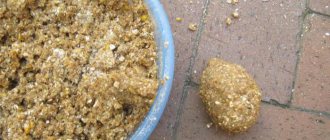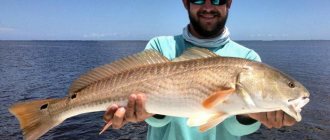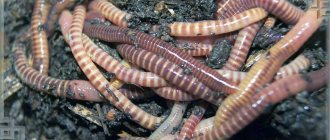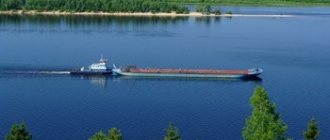Types of rain
This is atmospheric precipitation falling from the sky in the form of drops, the size of which can be 1-6 mm. There are small precipitations. Their intensity is different. Droplets can land without causing discomfort to humans. For protection you only need to wear a hat. It often happens that a lot of rain falls in a short period. For example, streams and water streams can form within 10-20 minutes. It's raining.
Usually the more intense it is, the faster it ends. Light precipitation may last for about a day. Rains are divided into mushroom, sunny, torrential, lingering, oblique, and streaky.
Catching perch with a devil in the rain
We should also talk about such interesting fishing as catching perch with a devil in the coastal zone. Cloudy weather with light rain and cool temperatures are ideal for this type of fishing. This is usually caught in late summer and autumn, when there are more and more rainy days.
We will need a fly or Bolognese fishing rod 5-6 meters long and a blind or sliding float with a carrying capacity of 4-5 grams with a drop body and a regular antenna with a ball at the end.
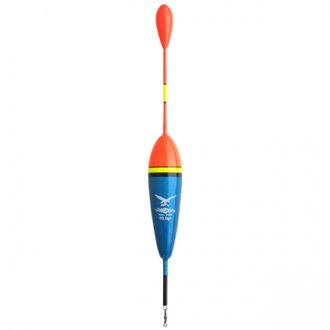
A fishing line with a diameter of 0.6-0.18 mm will do. We surround the float so that it does not dangle in the current and the tip of the antenna is always in a vertical position. Devils of red and black colors are used as bait. Each hook has a red bead. If the pond has not very clear water, then you can also tie threads of red and yellow colors to the baits.
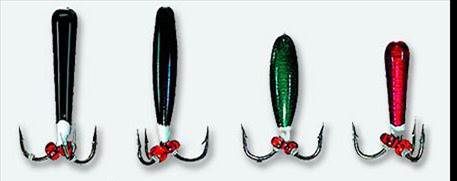
The weight of these baits is 3-4 grams. There is no need to place weights. We select the float so that it matches the weight of the devil. A worm, maggot or bloodworm is also attached to the hooks. You can attach different baits to each hook.
Fishing is carried out along the reeds and near the coastal dump. The devil is lowered to half-water and a little lower. Areas with current are selected. It turns out that the bait moves slightly above the bottom. Such fishing in the wire. While fishing, you can play along with the tip of the rod, making the devil dance. The depth at the fishing spot is 2-2.5 meters. The perch bites are reliable. The float confidently goes under the water or to the side. It is necessary to cut without tearing. A slight movement of the rod to the side and sharp hooks dig into the mouth of the striped predator.
Devil fishing is a popular fishing activity. You can fish in one place for 5 minutes or an hour. Depending on the size of the perch school. If we manage to catch a flock, then we catch it while there is a bite. As soon as the bites are over, we move on to the next section of the river. This fishing is very mobile and in some ways resembles chub fishing, when you have to change your location often.
Sometimes you have to put on wading boots and go closer to the reeds. At close distances, communication with such equipment is better controlled.
You don't need to feed the perch a lot. It is enough to roll a couple of small balls of earth with chopped worms and throw them into the wiring area.
When is the catch good?
Whether the fish bites in the rain depends on this. During prolonged summer showers with a cold north wind, there is unlikely to be a good catch. Usually during this period the pressure decreases. The fish is at the bottom and practically does not respond to feeding.
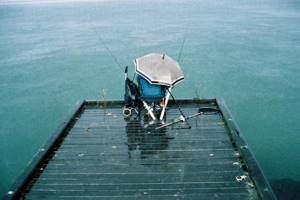
Do fish bite in the rain if it was heavy and short-lived? If after it the weather is sunny and without wind, then the bite will be good. Fishing will be excellent in drizzling rain with a slight warm wind.
Fishing in the rain. Factor No. 1 of a good catch is water turbidity
If approached correctly, fishing in the rain can be much more effective than fishing in calm weather. A successful catch directly depends on whether the water of the reservoir is cloudy . When the water has only changed color a little and has now become less transparent, then this is a great sign that the bite in the rain will be good. But when the water becomes very cloudy, you can’t expect a good result, you’ll just waste time.
Water turbidity degree
As already stated, the degree of turbidity of the water affects fishing success. If the water is cloudy even in the middle of the lake, then take a depth gauge and look for the coastal edge, in other words, the point where the depth difference . Cast your fishing rod to this point. The current carries worms into such places, which serve as bait for fish.
Fishing on overgrown ponds
If you catch fish in ponds overgrown with vegetation, then you must not forget that the fish in such reservoirs react well to bait. Then, ten to twenty minutes after baiting the fish, you need to start fishing. It is also necessary to provide that it is necessary to periodically change the bait, in particular, the dough for a worm, and then vice versa. If the fish begins to bite much less, or if it stops taking bait altogether, throw in a little more feed than usual.
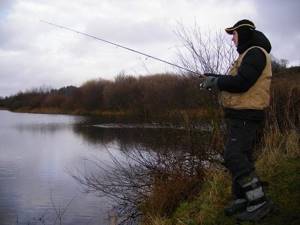
Fishing in overgrown ponds
Should you go fishing if it is expected to rain?
Before traveling, you should check the weather forecast. Is it worth fishing if precipitation is expected? It depends on their type, pressure, temperature. Do fish bite when it rains in June? Usually at this time the catch is good if the rainy weather gives way to sunny weather.
Do fish bite in the rain if it’s September? Usually at this time of year there are several days of warm weather, which may give way to precipitation. There will not be a good catch, so it is better to postpone the trip, otherwise it will not bring results.
Fishing in rainy weather
It is necessary to prepare for this event. It is important to prepare a large umbrella that will protect you from the rain. Waterproof clothing should be worn. Baits, bait and other equipment should also be protected. You will need a film or oilcloth that will allow you to cover it all.
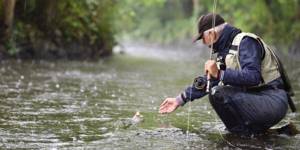
But you shouldn't hope for a big catch. There is a chance of rain overnight. It is advisable to spend the night in the car. If there is no transport, then you should take a tent and an inflatable mattress with you. The catch can be in small gaps, when there is no rain or gusty wind. At this time, rich catching of white fish is possible.
It turns out that good fishing is possible at normal pressure and rainy weather is not associated with a cyclone. With the temperature dropping and cold gusty winds, it is better to abandon this activity. Do fish bite when it rains, if there is a south or west wind? Reviews from fishermen indicate that during such periods there is usually a good catch. Do fish bite before it rains? This is a favorable time for classes.
Does the bite increase after rain?
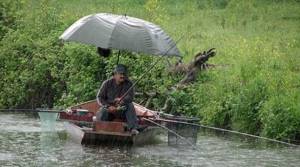
It has been noticed that the fish begin to bite during the rain, and after it ends, the bite only intensifies. Many fishermen are puzzled by the reasons for the increase in fish activity associated with changing weather. But it's quite simple to explain:
- The oxygen level in the water only increases after the end of precipitation.
- The increase in atmospheric pressure that occurs after rain also has a great effect on fish biting.
- The ions that saturate the water of the reservoir along with rainwater provoke the fish to become active.
Of course, this doesn’t mean that while fishing in the rain or after it, the fish will bite like crazy. Without the right tackle, bait and choosing the right fishing technique and tactics, you are unlikely to be able to please yourself with a good catch.
What should you take with you?
To make the activity comfortable, you need to take spare clothes, a raincoat, and rubber boots with you. An excellent option is a suit that includes a jacket and pants made of waterproof material. If you are planning an overnight trip, it is advisable to take dry clothes with you.
A tent will protect you from rainy weather. These products are made from waterproof fabrics. They can be easily deployed by one person. It’s even better to buy a tent-automatic. The device can be installed in a short time.
If you spend the night in a tent, you will need an air mattress or a small cot. The second option is perfect if you travel by car. There are comfortable models of mattresses that do not need to be inflated. Some of them are made with a cushion.
It is necessary to take a sleeping bag, as it is comfortable even in rainy weather. You can take a beach umbrella. But there are special devices that are similar to a tent. You will need equipment for starting a fire, as well as food and drinks. With careful preparation for this event, no surprises will be annoying.
Fishing Features
Fishermen have noticed that in rainy weather the fish go deeper. Therefore, you should not catch it in shallow water. It is advisable to do this in wide areas and throw the tackle into the riverbed area and near holes. If fishing is carried out with donks and feeders, then the bites are not frequent, but more confident. Crucian carp, bream, roach, and silver bream lay the bait so that the hook is retrieved by the extractor.
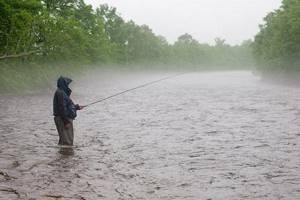
Usually in the summer before precipitation, bites are rare. But after a good rain, a great catch is expected. This is due to the addition of oxygen, which has a revitalizing effect on underwater inhabitants. The presence or absence of wind is important. If there are waves, then fishing will be unpromising.
Peaceful fish move to the shore when it rains. Therefore, it is advisable to catch it on the first edge or in the coastal area. It is better to use a float near the coastal dump behind the reeds, if there is no strong wind. For crucian carp, roach, and bream, it is better to use worms, maggots, bloodworms, and pearl barley. It is better not to fish during a thunderstorm. Fishing rods conduct current, so being on the shore is dangerous.
Fishing in the wire during the rain
Sometimes angling during rainy weather turns out to be very promising. In such conditions, the main thing is that there is a slight current in the fishing area, light rain and a slight breeze. The depth at the fishing spot is 1.5 - 2 meters.
It is better to fish with earthworms and underleaves, and with maggots. Fishing is carried out in the coastal zone with a fly rod with a float with a carrying capacity of up to 2 grams and a fishing line with a thickness of 0.14 mm and a hook No. 14 according to international numbering.
There may be some underwater vegetation on the bottom. We carry the bait along the bottom, but so that it is carried by the current closer to the shore. Often, a nimble roach actively attacks a worm or maggot and the float suddenly goes away or sinks. With a slight current and rain, the bottom layer is slightly agitated, and the larvae and worms are washed closer to the shore. Roaches and breams swim to such places to feast on meat food. That is why it is better to catch them with animal baits in such conditions. If there are caddis flies, even better. You can expect a very good bite from these larvae.
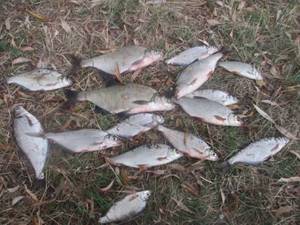
The active bite when fishing with a wire gradually subsides with the end of the rain. When the weather is calm, you can safely switch to fishing with donks and feeders.
Signs
Over the centuries, signs have formed about the connection between the catch and the weather. It is believed that the wetter the fishing, the better the fishing. This activity will be good in cloudy weather and drizzling rain, but in bright sun fishing will be useless. During the dry season, it is better to fish at dawn or sunset.
The phase of the moon also affects: with a new moon there will be a good bite, and with a full moon there will be a weak bite. Fishermen have noticed that an active increase or decrease in air and water temperatures will not lead to a good catch. And if the water warms up gradually, then the time will be right. Whether fish bite after rain and thunderstorms depends on many factors, the main ones being weather conditions.
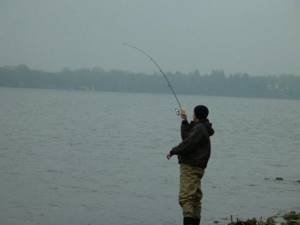
During drought, the water level decreases and the catch is poor, since during such periods the water temperature fluctuates sharply, which causes discomfort to the fish. It is best to fish when the water level is gradually rising.
Thus, it is better to do fishing in rainy weather during the warm period. Still, when setting off, you need to be prepared for anything, so you should take everything you need with you. Suitable conditions for this activity will allow you to bring a good catch, which is very pleasant for every fisherman.
How rain affects fish biting - let's figure it out
Experienced fishermen are sure that rain at any time of the year is good for fishing. After all, fish always react to rain. How exactly is another matter. But it reacts, reveals itself, makes it possible to understand how and where to outwit it.
I remember that as a child, my friends and I were sure that the crucian carp mistook the raindrops hitting the water for something tasty, and that’s why it rose to the surface. Based on this, as soon as the rain started to fall, we immediately got on our bikes and rushed to the pond, quickly cast out our fishing rods and dragged crucian carp almost on top, making a very small working descent on the gear, literally 20 centimeters.
Of course, over the years, becoming more and more convinced of the crucian's cunning, he stopped believing that the crucian carp mistakes the drops falling on the water for something edible, but did not stop hunting for this fish in the rain. True, at first it is not always successful. Most often the picture looked like this. When the rain came, the bite stopped, but after the rain it was great! It seemed that the explanation here was simple - at the same time as the rain, the atmospheric pressure dropped, pinning down the fish, which had temporarily stopped feeding. But what was munching under the coastal bush? Crucian carp! So, did they run away from my bait for more interesting natural food that the rain washes off the branches? Or were some bottom boogers just moving there with the rain, thereby attracting fish?
It’s impossible to say for sure, but usually with the arrival of rain the feeding area becomes quiet. Already knowing this, I put on my swamp boots and raincoat, and with a fishing rod I set off to wander along the shore. At this time, a jig equipped with a nod at the tip works better than a float fishing rod - there are much fewer hooks. After all, you definitely need to check the coastal snags, the submerged roots of bushes growing on the water's edge, small windows among the algae - it is in such strong places that you most often find heavy crucian carp during a rainstorm, as well as good roach, rudd, and perch. It is also a good idea to check places near wooded shores, where rain usually washes away forest insects and their larvae.
Drops of water knocking on the water are a good camouflage for the fisherman himself, but the fish can still show increased caution in shallow coastal areas, so I use a dark and small jig so that the fishing line can be pulled tight. But I don’t use fishing line thinner than 0.12 mm, since fishing often has to be forced, and the webs don’t allow this. It happens that such great crucian carp bite that you definitely need to use a 0.14 mm fishing line, otherwise there may be breaks, then the jig with the crucian carp leaves, and the whole flock is scared away.
And one more important point regarding fishing in the rain : the heavier the rain, the faster the water begins to become cloudy under the banks, but this does not scare away the fish at all, on the contrary, it goes into the very muddy water towards the water’s edge, apparently, this is where the most food is found. But in these conditions of limited visibility, the bait is preferably lighter and more active. A fidgety white maggot is ideal. If the fish takes better on a worm (or a piece of it), then I’ll simply put a bright jig - silver or painted in a bright lemon color.
When the rain drags on for a day, and continues to rain with short breaks, you get the feeling that the fish are running much less, returning to the places where they stood the day before the weather worsened. And again, fishing with float or bottom tackle begins to please. If the water has become noticeably cloudy by this time, then I throw in more bait than usual, about a third, feeding the fish more often. And you have to work more actively with baits, and it’s not a fact that animal baits, which seem to be ideal, will work better, but rather the opposite - some chatterbox or barley will excel.
If the rain drags on, drizzling day after day, then the behavior of the fish generally disappears from any differences from clear weather. I remember a couple of seasons when it drizzled endlessly, and eventually everyone stopped paying attention - wild birds, livestock, people, and especially fish. Mushrooms grew everywhere, and crucian carp were biting well everywhere...
It is very exciting to catch predatory fish, such as pike, in the rain, especially in summer and warm autumn . It seems that everything follows a consistent natural chain. First, the heat hung, everything began to freeze under water - the more intensely, the less oxygen in the water became. Everyone hid, huddled in their holes and dens. And then the rain comes - a holiday! Everyone perked up. Insect larvae, leeches, and water worms came to life and began to move, revealing locations of dense populations—white fish were right there! It has crawled out of the grass and snags and is actively feeding on various boogers, revealing its accumulations to the predator; pikes and perches are moving in. All aquatic inhabitants breathe easier, everyone eats each other, slurping and chattering their teeth, which is only to the advantage of our brother the fisherman! Spinning or live bait fishing rod in your hands and go.
Autumn dojis, of course, are no longer so interesting in terms of catching different fish , especially cold ones in October or November. Although they can be useful, especially on rivers - fish that have gone to the pits again come to the banks. This is especially noticeable with perch. It seems that the striped one has gone to the fairway holes, where it is periodically caught by spinners. And then it began to rain, it became even colder, the water began to become cloudy near the coastal grass, and lo and behold, a good perch began to bite on the “summer” spinners at shallow depths of 1-1.5 m, or even less. Why he returns to his “summer quarters”, I can’t say for sure, either the fry concentrates on the coastal mud, or washes away some worms near the shores, and the striped fish decide to feed on them before a long winter, or for some other reason, but it’s a fact on the face.
And I’ll also give one small point that speaks in favor of rain, except for laughter, I’m one hundred percent sure of this - rain in calm weather at shallow depths plays well with bait! Everything is simple here: drops of water periodically fall into the antenna of the float, the movements of which are transmitted to the hook with a nozzle...
So rain very often is not at all a hindrance to fishing, but an assistant to our business. The main thing is to be able to give proper comfort to fishing. A waterproof raincoat, high fishing boots, a warm jacket or sweater will not hurt even in summer, as the rains thoroughly freshen the air.
But I myself don’t fish during a thunderstorm and I don’t recommend it to others, even on the shore, let alone on a boat. Yes, during the period of “heavenly fireworks”, various fish can break through not only for a good bite, but even for a brutal meal, including my favorite crucian carp. But you can’t catch all the fish, and fishing in a thunderstorm is a very dangerous activity, and you can get such a blow that your heels will be charred... Therefore, I prefer to wait out the thunderstorm while sitting in the car. But under no circumstances am I in a hurry to go home, since after a thunderstorm the bite often noticeably intensifies, even if the rain does not stop.
Fishing is good without rain, but with rain it’s even better!
